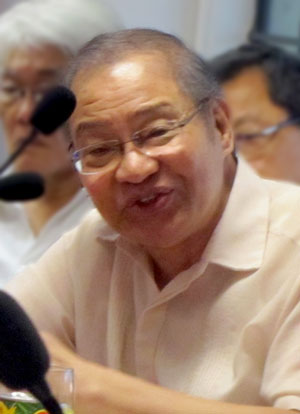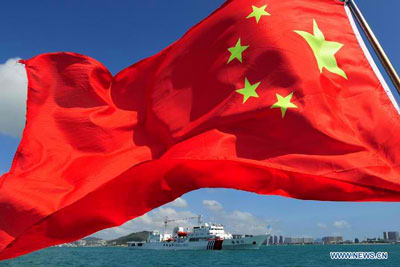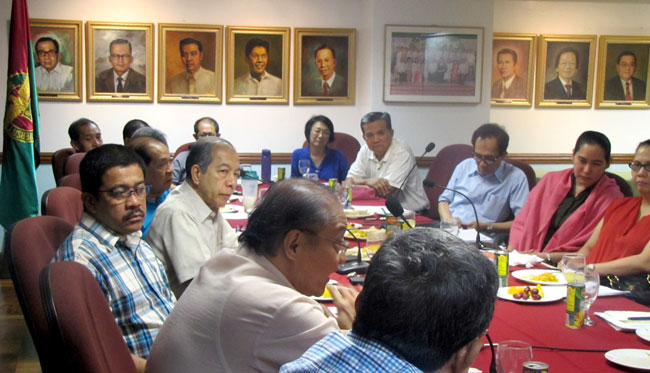TROUBLED WATERS
Breaking the Impasse: The Philippines-China Maritime Row
CenPEG.org
March 20, 2014

Chito Sta. Romana: There are options (Photo by CenPEG)
Is there a way of breaking the impasse in the maritime and territorial feud between the Philippines and China in the West Philippine Sea (South China Sea)?
This and related questions were the talking points in a 3-hour roundtable discussion on the maritime row between China and other claimant countries in the tension-filled SCS (WPS) held last March 13, 2014, at the alumni boardroom, Ang Bahay ng Alumni, UP Diliman. Organized by CenPEG, in cooperation with the office of the UP President Alfredo E. Pascual, the roundtable discussion was joined by 22 political scientists, international law experts, think tanks, China watchers, and leaders of people’s organizations.
Chito Sta. Romana, long-time China watcher and resource analyst, served as the lead discussant.
The maritime dispute between the Philippines and China has been heating up with reports of perceived Chinese assertiveness, on the one hand, and diplomatic protests by the Philippines, on the other. The International Tribunal on the Law of the Sea (ITLOS) is set to receive supporting documents from the Philippines which sought an arbitral intervention in a claim filed by the government’s solicitor general in January 2013. The Chinese government reacted to the filing as “an unfriendly act” by the Philippines and has refused to participate. During 40 years of diplomatic relations with China, the Philippines has received development assistance from Beijing in a regime of otherwise healthy trade relations between the two countries.
Warning that the window of conflict settlement is narrowing, Sta. Romana said there is still room for other options in preventing the intensifying tensions arising from the maritime row. ITLOS arbitration, he said, can be accompanied by a negotiated settlement including bilateral talks which has been consistently proposed by China but is opposed by the Aquino government. For these options to happen, Sta. Romana said, certain conditions must be met by both sides, such as: 1) De-escalation of tensions and the exercise of self-restraint; 2) Restore high-level dialogs; 3) Prepare for post-arbitration scenario; and 4) China should clarify its “9-dash line” territorial claim over the SCS and allow fishing in Scarborough Shoal.

Marine patrol ship Haixun 31 sails out of the port of Sanya, south China's Hainan Province. (Xinhua news photo)
The bilateral approach was used to settle many of China’s border land disputes since the 1950s with at least 12 countries, Sta. Romana said.
Sta. Romana also mentioned the broader challenges confronting China today. China’s rise as a regional if not a global power poses a challenge to American hegemony in Asia part of which is the control over strategic sea lanes in the SCS, he said.
Sta. Romana, an economics and business graduate of De La Salle University, pursued studies in the University of the Philippines. He also has a Master’s degree in international relations from the Fletcher School of Law and Diplomacy in Massachusetts.
Sta. Romana was forced to live in exile in China for nearly four decades following the imposition of the writ of habeas corpus in the Philippines by Ferdinand E. Marcos in 1971. Now based in the Philippines, he works as an independent China analyst and frequently gives talks about China to interested groups. Active in promoting people-to-people exchanges between the Philippines and China, he is also a member of the Philippine Association for Chinese Studies (PACS).

De-escalating tensions, reviving high-level dialog (Photo by CenPEG)
Among the discussants in the CenPEG March 13 roundtable were Dr. Benjamin Muego, a UP educator who also taught at the School of Professional and Area Studies, U.S. Foreign Service Institute in Arlington, Virginia, and currently a visiting professor at Ateneo; former Asian Center Dean Armando Malay, Jr.; former Diliman Chancellor Roger Posadas; Profs. Felipe Miranda and Malaya Ronas; Dr. Rene B. Azurin of AES Watch and a BusinessWorld columnist; lawyer Marie Yuvienco; Dr. Theresa C. Carino of Amity Foundation; Atty. Jay Batongbacal of UP Law and Asian Center; Bayan Muna Rep. Carlos Zarate; Bayan Chair Dr. Carol P. Araullo; Pio Verzola, IBON International; and Salvador France and Gerry Albert Corpus of Pamalakaya, a national federation of fisherfolk organizations.
CenPEG Board chair Temario C. Rivera acted as roundtable facilitator with Bobby Tuazon, CenPEG’s director for policy studies, giving the overall synthesis. CenPEG.org
- Probing presidential platforms
- Conference calls for people-centered policy actions for Asian development and peace
- WWII 'comfort women' urge visiting Japanese emperor: OFFICIAL GOV’T APOLOGY, UPHOLD TRUTH, and JUST COMPENSATION
- FEARLESS FORECAST (EPISODE II): Comelec will not comply with e-Commerce Law in 2016 elections
- Fearless forecast: Comelec’s non-compliance with the AES law in 2016 (last of 2 parts)
- Fearless forecast: Comelec will not comply with the AES law in 2016
- CenPEG releases travelogue
- Experts: Nuisance bets reflect disillusionment, uneven playing field
- Partylist solon presses for tax cuts
- The True Cost of a Political Campaign
- Management decisions: Based on RA 9369 or purely Comelec’s?
- CenPEG holds 1st roundtable with media on presidential poll results
- Filipino IT can do it!
- FIT4E: The only transparent solution
- Realpolitik in the maritime tiff
- China’s challenge to PH sovereignty
- Choosing the next president
- Fixing the presidency, reforming the state
- New Comelec chair says he’s open to other election technologies
- SC ruling on AES Watch Pabillo and IBP vs Comelec, Smartmatic-TIM
- Comelec must explain P3.2B unliquidated cash advances
- CONGRESS ASKED TO HOLD DEMO ON PCOS HACKING
- 25 Bishops ask poll body to stop midnight deal with Smartmatic
- Pope Francis: reform and conversion
- 2 poll watch coalitions stage rally vs Comelec-Smartmatic midnight deal
- AES Watch questions Comelec-Smartmatic midnight deal
- ASEAN-India: Building Youth Partnerships through Culture and Entrepreneurship
- CenPEG forges research exchange and partnership with Jinan University
- FOI: Bearing fruit or foiled again?
- Remittance with Representation: The right to vote of overseas Filipinos
Center for People Empowewrment in Governance (CenPEG), Philippines. All rights reserved


